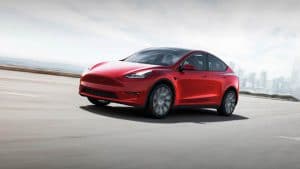
Even the launch of the Tesla Model Y couldn’t electrify the U.S. EV market during the first half of 2020.
This is turning into a big year for the EV market, as an array of new offerings, from the Porsche Panamera to Ford Mustang Mach-E, roll into showrooms. But only one new entry seems to have buyers plugging in at any significant volume: the Tesla Model Y.
A look at the sales numbers for the first of this year reveal that EVs, in general, didn’t fare particularly well during the pandemic – though that’s true for the rest of the auto industry which saw demand drop by roughly half in May and recover only modestly in June. The question is whether the overall rebound of the U.S. market, along with the arrival of so many new EV models during the second half of 2020, will start to charge up demand.
For now, Tesla remains the only battery-car provider to show any real momentum, something reflected both in its improving financial picture and the astronomical run-up of its stock – which is triggering a five-for-one split later this month. Tesla not only dominated the BEV sales charts for the first six months of this year, but also the Model 3 alone handily outsold all of its competitors combined.
(Lucid claiming 517 mile range for Air EV.)
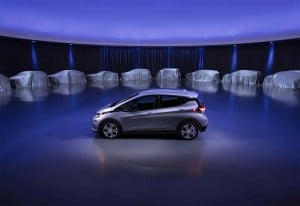
The Chevrolet Bolt EV did beat out the Model S, but its sales still lagged far behind the rest of the Tesla line-up.
While some manufacturers aren’t offering precise sales numbers, CleanTechnica estimates U.S. buyers purchased 38,214 Tesla Model 3 sedans during the first half of 2020, making it the overwhelming favorite all-electric vehicle on the market. The closest any non-Tesla BEV came was the Chevrolet Bolt BEV which registered a comparatively anemic total of just 8,370 sales.
The Tesla Model Y SUV, still in ramp-up stage, generated 18,861 sales during the first half, with the bigger Model X coming in at 9,500. Though the Chevy Bolt did manage to outsell the now-aging Tesla Model S, at 4,700, all four of the products Tesla offered were in the U.S. market’s top five BEVs.
Looking further down the chart is also quite revealing. The Nissan Leaf, which was the world’s first mainstream all-electric vehicle, has clearly lost all of its momentum despite getting a complete redesign and, with the Leaf Plus, roughly triple the range of the original BEV. That hasn’t helped, it seems, all versions of the Nissan battery-car racking up sales combined of just 3,006. Put another way, Leaf sales were down about 50% from the year before.
The Volkswagen Group has high hopes of becoming a dominant player in the nascent market for battery-electric vehicles. The first-half results might give the German maker pause, however. The Audi
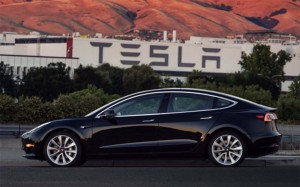
The Tesla Model 3 outsold all other non-Tesla EVs combined during the first six months of the year in the U.S.
e-tron, its first long-range EV effort, hasn’t exactly lit up the market, sales from January through June totaling a mere 2,872 here in the States.
Then there’s Porsche, which certainly grabbed plenty of headlines with its high-performance Taycan. But the battery sports car might have had more reviews than sales, first-half demand coming in at a mere 1,038, according to CleanTechnica.
Not one of the many other EV makers cracked the 1,000-unit total for the first half of 2020, BMW’s i3 barely reaching a quarter that level despite its own recent upgrades. For the second quarter alone, it was off 85%, for the first half, Americans bought just 252 of the electric city cars.
(First Drive: 2020 Tesla Model Y Performance.)
How things will fare going forward is anyone’s guess. EV proponents have to be worried based on what we’ve seen so far this year. Despite its overwhelming market dominance, even Tesla didn’t do as well as it might seem, once you take a closer look.
The automaker does not reveal a U.S. breakout but InsideEVs estimates Tesla nominally sold around 90,750 vehicles in the U.S. between January and June, which it estimates was somewhere between 3 and 10% below last year’s numbers.
That might seem relatively modest considering the overall crash of the U.S. automotive market but one also has to consider that Tesla only recently added the Model Y, the SUV that CEO Elon Musk had previously boasted it could see double the demand of its popular Model 3 sedan. No question the Y is in ramp up, but it couldn’t completely defy economic realities during a pandemic.
Now that U.S. sales are starting to rebound, the question is whether the EV market will also build some muscle.
On the downside (for EV sales anyway), gasoline remains almost absurdly cheap. While AAA reports regular self-serve is now back up to $2.178 a gallon nationally, up about 40 cents from April’s low point, it’s still about 40 cents below year-ago levels – and, AAA reports, is trending downward again. Low fuel prices have clearly been shown to negatively impact demand for EVs.
On the plus side, there’s a flood of new product coming, including all-new models like Ford’s Mach-E, Volkswagen’s ID.4, the Polestar Two, the GMC Hummer and others, as well as upgrades and new variants of existing products, including the Audi e-tron and Porsche Taycan. The wave will grow even larger in 2021, and Tesla itself is moving towards the roll-out of another eagerly anticipated model, its Cybertruck pickup.
(Hyundai launches new Ioniq EV brand.)
Will this product blitz pay off? Not everyone is convinced, but Pat Romano, CEO of ChargePoint, is nothing if not bullish. “Up til now, the market has been vehicle/make/model limited, meaning that while a lot of consumers had the desire to buy electric they couldn’t find a car in their price range that fit their lifestyle,” he tells TheDetroitBureau.com. “Now, you’re starting to see some significant battery-electric vehicles with good features targeting the mainstream and, as that happens, you’re going to see a massive uptake of those vehicles.”

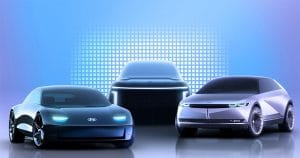
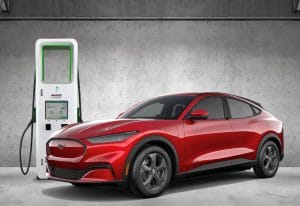
BEVs still mostly cost more than gas or even hybrid competitors, plus, as we have discussed before, there is charging station anxiety – if I want to drive this car outside my normal home area will I be able to find somewhere to charge? Even if there are charge points, will they be occupied and will I have to wait a long time to hook up? Plus, now that public charging stations cost money, some of the perceived cost savings over gasoline is disappearing. Over time, all of this will probably change, but we’re not there yet.
Paul, I have been driving electric vehicles since 2016. I completely understand your comment as I too had some anxiety about owning an EV as my daily drive and only vehicle. I Live in Texas and drive, on average, about 30k miles per year since I have friends and family on both coasts and in Illinois an Wyoming. Fortunately, most EVs either “know” where to charge and tell you when/where to stop though the navigation system or have smartphone apps that tell you where charging stations are located. As of March 2020, the U.S. had more than 78,500 individual public EV charging stalls at more than 25,000 charging stations. From 2016 through 2018, I was stationed at Shaw AFB, SC. I made repeated trips from Sumter (Columbia), SC to Dallas and yes, it did take a few hours longer in an EV than it did in a gasoline car but it was still a 1 day trip, even with charging time. After 4 years driving EVs, I doubt I will ever own another gasoline or diesel engine vehicle. I urge you to schedule a test drive of the EV model offered by your favorite manufacturer. I think you will be impressed.
Hi, Craig, Not to be rude but you are doing what so many EV proponents do: confusing accurate reporting for criticism. The sales numbers ARE the sales numbers, and they were down more than the overall market in a year when EVs were widely expected to gain momentum. Even the addition of the Model Y could not bring Tesla sales into the plus column. (And, FYI, for all the headlines about Tesla posting a profit, that came from selling credits to other automakers.)
I have driven virtually every EV now on the market, including some only available abroad and a number of models not yet on the market, ie the Mach-E and Polestar Two. I will be reviewing the latter on Thursday, if my schedule holds, otherwise next week.
I consider myself a “skeptical proponent.” There are things about EVs I love, ie the instant torque, the quietness, etc. The reality is that pricing is still an issue and will be for at least a few years. Range is growing but is still an issue with many — the 200 miles of the e-tron, ie, doesn’t quite cut it. And, living in Michigan, one realizes that EPA range is highly misleading. As AAA, Consumer Reports, this site and CNBC have reported (me penning the reports for the latter two), winter range falls by nearly half, even pre-conditioning only partially addressing the problem. Musk, himself, mentioned this during his last earnings call, noting that, going forward, EVs will need to offer at least 300 miles to avoid having range dip to unacceptable levels in winter. Several automakers are working to address this issue but the big problem is the loss of cabin heat. While advocates may be willing to sacrifice a certain level of comfort, that is NOT a mainstream solution. As to charging stations, I have also written extensively about that. I just did a Q&A with Chargepoint CEO Pat Romano that got into this. The numbers are rapidly growing but there are still huge gaps in many parts of the country. I live in a major suburban area just north of the Detroit city limits. There is but one Level 3 system within at least 15 miles and that only 50 kW, a single stall and a record of breaking down. This in the Motor City where the Big Three are planning to launch scores of BEVs by mid-decade. Like 80% of EV owners, I charge at home when I get an EV. But if I want to go, say, to Mackinac Island or Traverse City, there are challenges. Solvable, perhaps, but inconvenient, at the least. As Romano acknowledged, people need to see owning an EV as a seamless shift before they become mass market. This is beginning to change on all fronts: cost, range, charging locations and time, but we are NOT there yet. More importantly and immediately, market acceptance isn’t there.
It is my job to report the facts, not to promote a technology — even one I DO believe will eventually dominate. Thanks for your comment. Watch this space as we will continue to cover the EV business and will expand reviews as more products become available.
Paul A. Eisenstein
Publisher, TheDetroitBureau.com
Really well said, Paul Einstein. I do think I will someday own an electrified car, but not yet. I did read a report that the next version of the Boxster and Cayman will be all electric. Maybe then…
It’s Eisenstein…but thanks!
Paul E.